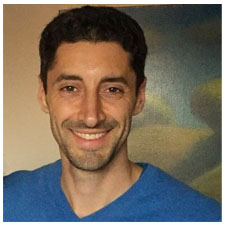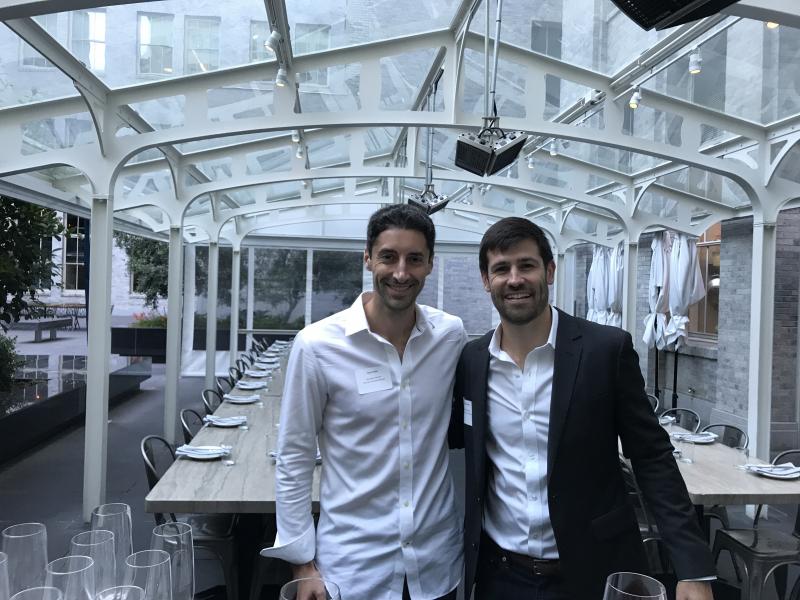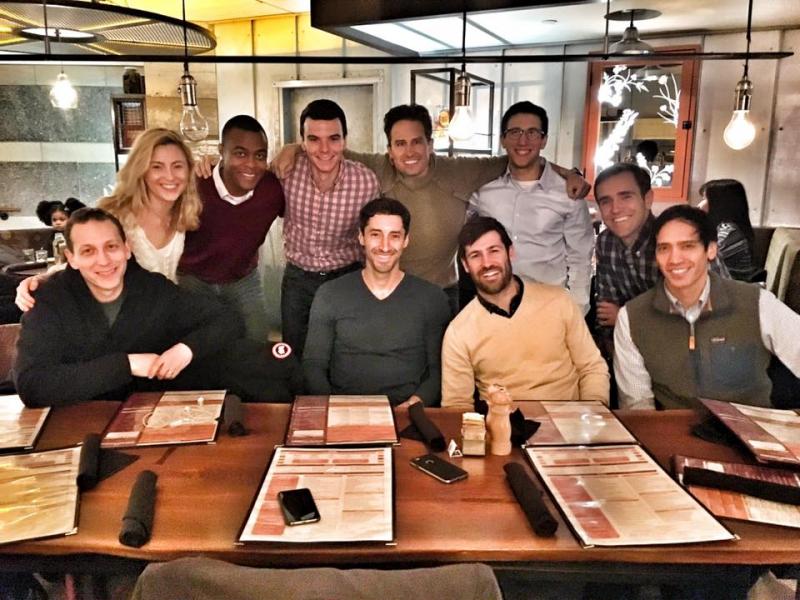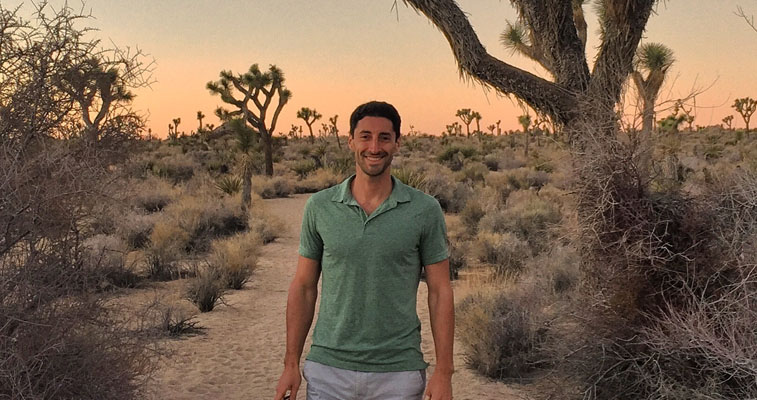After a short hiatus, I'm delighted to be back and interviewing a Partner from a fund that I've been connected with for a little while now, NextGen VP. The fund, based out of D.C., has partners spaced out amongst many of the major cities in the US and a vast network to match. I sat down with Chris Keller, the Boston-based Managing Partner at NextGen to talk about his global upbringing, career choices, and his mentality on fundable founders.
Nina Stepanov: Tell me about your background - where did you grow up?

Chris Keller: I had a somewhat unique upbringing. My dad, who came to America when he was 27 from Switzerland, joined Citibank’s International team which caused us to move around a lot. The family started in New York but the first 9 years of my life were abroad. I was born in Kuwait then we lived in Abu Dhabi, Dubai, Qatar, and Doha and then I started school in India in what was then Bombay (now Mumbai). I was there for about 3 years and then spent 2 years near Frankfurt and then moved over to the US in the middle of 3rd grade when I was 9. It was a cool upbringing and was great for learning to be adaptable and experience other cultures early on.
NS: Why did you decide to attend Virginia Tech?
CK: In high school, everyone assumed I was going to end up in business because I was outgoing and had the personality fit. I thought I was too, but in my Senior year of high school I decided to take Computer Science and I ended up finishing the course in half the year. I was pretty good at it and really enjoyed it. It was 1999 and everyone was starting to talk about how programming was the skill to learn. That was ultimately why I decided to go to Virginia Tech. Virginia, like Massachusetts and many other states, is very lucky to have very good public schools. We have UVA, William & Mary, and Virginia Tech, all of which I applied to but once I got into Virginia Tech I decided that was where I wanted to go because it has the best CS program. I ended up pursuing a degree in Computer Science & Economics because I really enjoyed Microeconomics and I thought it’d give me a broader understanding of the business world. I’ve always thought of myself as a balanced person between being business oriented and technical at the same time and it’s brought about a lot of opportunities I wouldn’t have otherwise had.
NS: Tell me about your early career after college.
CK: When I was graduating in 2003, there was no startup scene to be spoken of. It was popular to go through corporate leadership or rotational programs that move you through the organization quickly. I took that path and landed at Johnson & Johnson, where I did three, 8-month rotations. During one of those rotations, I spent time in Silicon Valley, and found that I loved the Bay Area. I ended up spending 3.5 years at J&J total, mostly in New Jersey at their headquarters. The best thing about that experience was that I learned the corporate lingo, the work/life balance, and I got to see what it was like to be a regular employee in a big place. I had been entrepreneurial in college and started a few side companies while there, but while I was at J&J I was always coming up with new business ideas. The difference though was that I could actually build them. My third year at J&J I started working on what was basically the Facebook of the Tennis industry, which actually got me recruited out of J&J. A Venture Capitalist in London who played Tennis at Harvard reached out about an incubator that he funded in Boston where they were doing something very similar to what I built in another industry. He connected me with them and they ended up offering me a job in Boston. Within the first 6 months at that job, Fafarazzi, a startup I co-founded on the side at J&J as well, started to take off so my co-founder Todd Galloway and I quit our jobs to pursue this while paying ourselves almost nothing. We ended up raising a seed round from a fund in New York City and had achieved our dream, running a venture backed startup full time! After 2 years, I joke that my partner and I went through the amicable divorce, which looking back is actually a great experience to have gone through from a startup maturation perspective.
NS: Talk about your time on the HubSpot Labs team and how that led to FollowUp.cc.
CK: When I left Fafarazzi, I was catching up with Dharmesh Shah and he invited me to become the entrepreneur within HubSpot where we’d be building anything we came up with. The intention was to build things that might become part of the main HubSpot product or it might just become their own thing. This was all coming off the success of the Graders like Website Grader and Twitter Grader. I built a few things, including Alerts Grader, whose goal it was to show only the valuable alerts.
Then, I started working on Blog Grader, which had already existed but we rebuilt it with a better scoring engine and with the idea of integrating it into the actual product. I really enjoyed my time at HubSpot and am still close today with many of the folks from there, but after about a year, I realized I had to go turn FollowUp.cc into a real business as it had started to gain a lot of traction because I believe one of my friends told LifeHacker about it and it just kinda exploded. Within 3 months I launched the paid version and grew it from there. FollowUp was just a good idea that people found useful so when I got any PR, it was a great lift for me. I grew it for 3 years and decided that even though it’s a huge market, it would get commoditized into email clients at some point in the not too distant future and the early adopter crowd wouldn’t likely stay customers and those were the folks I was best at reaching. And at that point, I wanted to move onto my next thing. I had a few acquisition offers along the way and then one came in from a serial entrepreneur on the West Coast who liked to further develop high margin, high LTV businesses like FollowUp into cash cows that were part of a larger portfolio of complementary products. So after that sale, I became funemployed alongside my girlfriend who coincidentally ended up shutting her business down (for silly reasons sadly) on the exact same day. We decided to travel for 5 months after only being together for 6 months, friends were nervous for us, we weren’t!
NS: What brought you to venture and specifically NextGen?
CK: After some time off, I got connected to the guy who is now one of our partners in DC, Brian Vahaly. They wanted him to join and he had a pre-existing relationship with co-founder Brett Gibson from their college days. He said these NextGen guys are doing something different and I’d like your opinion as a startup guy. I met with them, liked their model, and gave Brian my feedback. He then said they’re looking for someone like me in Boston and they’re probably going to call at some point. I said “Great! Have them call me when they’re ready!” A few months later they gave me a call and after some diligence, I decided to join the team.
As an early venture fund, you don’t want to say you’re a startup but starting a venture fund these days is really similar to starting any other startup. I decided that if there was ever going to be a foray into venture capital for me, this was the right entry point for me given NextGen’s need for tech and scalability in addition to all the other typical venture fund operations. In addition, I had been working on my own for many years before this role so it was actually a very natural fit for me to be the sole partner in the area.

Let’s talk about NextGen Venture Partners and your investing activities
NS: What stage of investments do you primarily target?
CK: Early stage overall. We participate in Seed rounds (by any definition seed means today) and have led some Seed rounds as well. We’ve also participated in a bunch of Series A rounds but there’s a variety of factors to consider as always.
NS: What are the top traits you look for in terms of investing into a company or founder?
CK: I have to steal my answer from Nabeel Hyatt at Spark Capital. You should look at the person across the table from you and ask yourself, “Could I co-found a company with this person?” and “Are you willing to be ‘married’ to this person?” People joke that finding a co-founder is like getting married and it’s pretty much the same for investors.
Narrowing it down, I focus on those who can get things done. Persistence and problem-solving are most important to me. I also look to see if they’ve overcome micro challenges along the way. Are they someone who came up with an idea and are just trying to raise money because they’re smart and have the ability to sell some vision or have they gone and done the research, built the team, and gotten commitments from the prospective team? Those traits of vision, persistence, and management, as well as honesty and integrity, are incredibly important. Those are traits that an investor really wants to see because that founder will figure it out with or without your investment.
NS: What sectors of technology, industries, or trends are of interest to you?
CK: I’m personally interested in the ‘quantification of self’, which are devices that are digitizing pieces of your health, teaching you things about yourself, letting us know more about ourselves internally.
I think a lot in terms of mediums and platforms, such as mobile. Mesh networking as a category has never really taken off in the US but I’ve always been very intrigued by it, which are devices being aware of each other locally without the internet. Parlaying off of that is this new area of voice in regards to input and gaining knowledge faster. There are a lot of challenges with it and it’s very much in its infancy but it’s nice to see the likes of Amazon, Google, and so on getting better at it.
NextGen is pretty broad and we have expertise in multiple areas thanks to our network but personally, I’m excited about startups that are considered enablers.
NS: What is the current fund that you are investing from?
CK: It’s our first fund, $22M. We generally write checks around $750K depending on the size of the round, what the entrepreneur needs, and whether we’re leading or not. We’ve done 16 deals in the last 17 months, aka about a deal a month, which is hectic at times but we’ve set ourselves up to handle the pace.
The nice thing about our fund is that we act like a bigger fund than we are because of the model we have with our Venture Partners. We write a check from the fund into a special purpose vehicle (SPV), which is just an LLC, and then the Venture Partners get to choose if they want to write a check into the deal with us. We roll up all the capital into one check and write that to the entrepreneur. It’s a very flexible model for us and the Venture Partners, which provides them a lot of value and for the entrepreneur, they get more people invested in their success while still having the convenience of working with NextGen directly. We’re like any other venture fund; we are the team, we’re manning the relationship and making sure the ventures are supported, we’ve just got a lot of help and smarts at our disposal. We have 820 people around the country and most of them have been founders, executives at tech companies, and so on. This community means that when our founders need something, we likely have someone who can step in and help out.

NS: Which investments from NextGen are you involved in?
CK: We don’t actually do it as “my deal, your deal” but obviously by proxy of geography you’ll find a partner spending more time with certain companies near them.
I’m actually doing this interview with you from one of our portfolio company’s offices in Boston called Renoviso, an end-to-end eCommerce based business for home renovation. Our most recent investment here in town is Circulation, which is a management layer that sits at the intersection of non-emergency medical transport providers, medical care establishment, and patients.
Those are the only 2 we have in Boston but we’re on the cusp of a couple more!
A few retrospective questions!
NS: Who do you admire or who has been the greatest mentor for you?
CK: I can’t point to one mentor because I have had so many good people around me over time who’ve all contributed something to my life at a different stage or phase. There are always going to be a few people that you go back to regularly like my friend Charlie in Denver who’s one of the smartest people that I know thanks to the logic he always brings to the table. I also had a conversation the other night with Nabeel as another product centric entrepreneur who went into VC and we talked about the change in mentality and the forces behind how you operate in this role. Even my old roommate, Brian Balfour and I are still good friends and he’s a very thoughtful guy. Dan Scholnick at Trinity Ventures has been a good friend for a long time and has given me a great perspective on being a VC.
NS: Outside of being a VC, what are your personal interests or activities?
CK: I had 2 reputations for a while in the startup scene. The first was being "the health guy" or nutrition guru. I learned a lot in the space over the years, but have had less time to engage and thankfully, the base template I’ve built for myself is easy and doesn’t take any effort, so at this point, it’s just a part of how I operate. I also learned how to meditate when I was 15 years old so I’ve always had this focus on self-improvement. (on this note, shameless plug for one of my local personal investments helping people easily learn to meditate, 10% Happier)
I’m also a big tennis fan and have played since college. I love the outdoors and hiking and I love photography. I put everything on Instagram and am a fan of great nature scenery.
NS: Where did you travel with your now fiancee for those 5 months after FollowUp.cc was acquired?
CK: The first 3 weeks we were in Florida at my fianceé’s family home. We then went to Tahoe for a ski trip and changed up the scenery by going to Kauai for 2 weeks after that. On the way back, we stayed with my aforementioned friend Charlie in Denver followed by a 36-hour layover in Boston after which we continued to a wedding in Belfast and then onto London and Amsterdam, which we fell in love with. We then stayed over in Iceland on the way back, followed by DC for a bit and capped it off with a trip up the California coast from LA to Napa via the Pacific Coast Highway (to attend Brian Balfour’s wedding at the end of all that). That was it!
Nina Stepanov is a Contributor at VentureFizz. Follow her on Twitter: @ninarstepanov.
Images courtesy of Chris Keller and NextGen VP.

